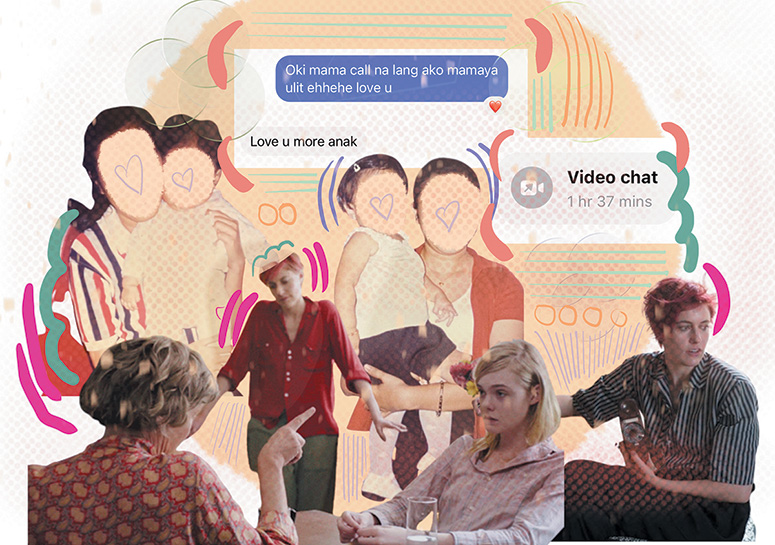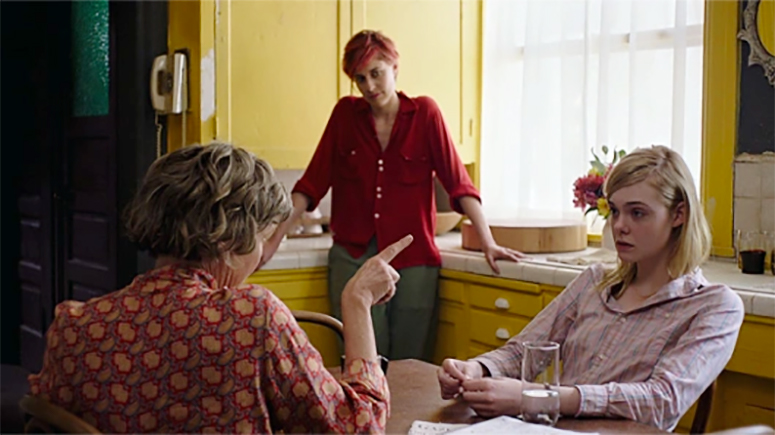Combing through memories of Mama
It’s been 14 years and six months since my mother left for the US for the so-called greener pastures most Filipinos dream of for their families. But I had to pay the price of losing a pillar in my life.
I’ve spent about a quarter of my life without a mother. Sure, there have been mother figures in my life — aunts, grandmothers, even a stepmom — but the feeling of missing something in my life still haunts me, no matter how hard I try to come to terms with it.
About two years ago, I bleached my hair blonde. It was the height of the pandemic, and I was doing everything to keep myself sane in the middle of lockdowns. I found myself in my room rubbing the soft blue goo in my hair to bleach it blonde as the base so I could dye it to a candy-like lavender shade. Of course, it turned brown-like on the first try. Beyoncé’s Blue was playing on my laptop; I had it on shuffle under Beyonce’s discography. Then I remembered how Mama would also listen to Beyoncé most of the time, or Destiny’s Child, a memory that’s eternally in black and white in my brain.

“We can last forever,” Beyoncé croons, while her daughter, Blue Ivy, cameos for a small part in the end. While I was slathering my already dead hair with the bleach solution, filling up my room with the smell of chemical funk, I can’t help but think back on the one thing I wish I had shared with my mother, who went away when I was young.
There had been a million moments I’d seen shared by mothers and their kids in public — on the train ride to work, waiting in line at the grocery store, strolling down the sidewalk. Suddenly, I imagined Mama brushing my hair to a nice, smooth fix. I used to have curly hair, even wavier than it is today. As a child, I hated how it looked, because my classmates all had straight, thin hair. In disbelief, I found myself laughing at the thought of me wanting my mother to comb my hair again — a connection I was deprived of for the last 15 years.
She’d shake me awake, prepare my bath and breakfast and then proceed to dry and comb my hair, then tie it into fancy braids with these pink fluffy hairpins she bought at the nearest Marcella. This is how I will remember my mother, erasing the years of yearning.
The months before she left, I made it a point to always stare at her face, and memorize every outline because I was afraid I’d forget how she looked like, or how she felt like beside me. It was hard for a 10-year-old to endure. But because I had this instinct that she’d leave, I did everything I could to be with her, to feel her everywhere. Somehow, back then, I’d known she’d have other plans — plans that didn’t include me, that did not involve her combing my hair every day.
I’ve spent about a quarter of my life without a mother. Sure, there have been mother figures in my life — aunts, grandmothers, even a stepmom — but the feeling of missing something in my life still haunts me, no matter how hard I try to come to terms with it.
Growing up I did not have a hard time, so I always told myself. I was too strong for a kid whose mother had just flown halfway across the globe and made promises meant to be broken. I was too strong for a kid, that I forgot how to be a kid. Every waking hour for me was picturing that one classmate I had whose mother went to school every lunch time to bring her food. Sometimes I’d see them go straight to the church beside our school in the afternoon. I used to follow them, and just stared at the mother. I never imagined it was my mother and me.

I developed a sense of self, and learned a handful of things from women staking their claims in the world. Women becoming leaders, writers, teachers, lawyers, activists. Women becoming mothers. Women who refuse to become mothers. I still don’t know how women should make decisions in a society built around the practice of complicity but I made it a point to just decide that maybe having a mother wasn’t my destiny, at least for the first 10 years since she left.
I remember watching 20th Century Women by Mike Mills, which talks about three different women who have differing ways of surviving the final dregs of the ’70s, getting educated by feminism — which was then still a “new thought,” and talking about menstruation at the dinner table with men. It was and still is taboo to do so, but the scene made me happy and seen.
In the movie, the three glaringly different women break apart every aspect there is when it comes to moving on — city to city, person to person, and from an old logic to new opinions. I’d like to think that this was when I fully understood what really happened, what really became of my mother: She became a woman who had to defend herself, and in becoming one she had to choose a different path.

The clinching moment was when the pre-adolescent character, Julie, ran away from her mother with whom she does not have a relationship. What made it more ironic was the fact that she shared the same name with my mother. I told myself maybe I have it better than her because not having a mother growing up was better than having her live with you but never forming something solid with her. But I’m partially wrong to assume that. We may be on the same path of womanhood, but the tenderness of each other’s presence will always be yearned for.
I have already forgiven my mother. We talk constantly online now. We know each other’s secrets; I now know the real reason she left. But I will always feel this space, this wide gap between us that I cannot seem to jump over, because I never grew up with her. At 25, I never thought I’d still find myself crying over lost time and the distance between us. What it would have felt like if she was around when I got rejected by my crush when I was 17, or how I dealt with my first break-up for a full month before I actually cried because I told myself I had to finish and defend my thesis first. Or how I would have looked like if she was just around to help me pick out the perfect prom dress. (I didn’t like it in the end; I looked horrible because I decided to come at the last minute.)
Maybe I’m not meant to be someone’s child, I used to always tell myself. Somehow all the women in our family who tried to reach out to me growing up, I turned down. I was polite, I was accommodating, I accepted their heartfelt sinigangs and hand-me-down clothes. But I always turned down their warmth, prevented them from gaining access to my heart. I always found it hard opening up to people trying to be a parent to me, except for her, who’s only one video chat away, but is 18 hours behind in Manila time. Growing up, I realized, made it easier for me to be a child, to be vulnerable, to be disgustingly childish, to be a girl, not a woman.
Growing up I did not have a hard time, so I always told myself. I was too strong for a kid whose mother had just flown halfway across the globe and made promises meant to be broken. I was too strong for a kid, that I forgot how to be a kid.
Turning 25, I never thought I’d ask these questions, and ruminate so much on the years I held my own hand, like the day I got my first period and knew not what to do. (I was too shy to tell my dad, so I went to the nearest sari-sari store and bought the first sanitary napkins I saw.) I turned out okay, combing my own hair. I may have failed when I decided to bleach it and basically fry it to death. I did commit to it, at some point. Eventually, I got tired of maintaining it, and hated myself because it got frizzy. I ended up chopping it off so I can regrow the dry, dead strands.
In 20th Century Women, one of the characters gets the harrowing news that she might not be able to bear children because of what cancer did to her cervix. It made me cry, because I have the same fear, the same anxiety of being a woman but lacking the capability to get pregnant.
I used to keep wondering what I’ll be like once I become a mother, before I finally decided to not have kids altogether. Maybe it’s the sadness and longing I’ve felt for most of my life that I just decided to drop the idea, or it’s just me plainly rejecting the notion of raising a child on an already dying planet marred by economic turmoil and everyday evils. Either way, this bloodline ends with me, I guess. I can entertain the idea of getting married, but forming a family with an actual child is scary and not ideal.
“Baka magbago pa isip mo, ‘wag kang magsalita nang tapos,” (“You might still change your mind, don’t speak with finality,”) my mom joked while we were on a call. I just laughed at her and nodded my head. The thing is, she’s right. I might still change my mind. But in my head, maybe the reason I can’t imagine being a mother is because I don’t have the core ideas of having one, or the core memories to unlock and relive some mother-daughter moments.
I used to keep wondering what I’ll be like once I become a mother, before I finally decided to not have kids altogether. Maybe it’s the sadness and longing I’ve felt for most of my life that I just decided to drop the idea.
As I sat in front of the mirror destroying my hair follicles, I remember the first morning without my mother, the first time I combed my hair in the mirror, figuring out how I should part my hair. “The right side should be fine,” I thought, because I looked cute. For a 10-year-old, this was a major decision. They say it takes a village to raise a child, but it only took my two hands and a pink comb, already graying on the sides, to help me sit with my past grudges and stare at them without reacting violently.


